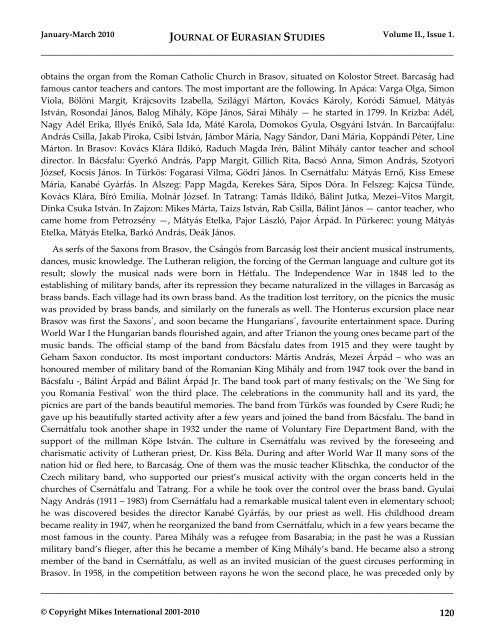EurasianStudies_0110..
EurasianStudies_0110..
EurasianStudies_0110..
You also want an ePaper? Increase the reach of your titles
YUMPU automatically turns print PDFs into web optimized ePapers that Google loves.
January-March 2010 JOURNAL OF EURASIAN STUDIES Volume II., Issue 1.<br />
_____________________________________________________________________________________<br />
obtains the organ from the Roman Catholic Church in Brasov, situated on Kolostor Street. Barcaság had<br />
famous cantor teachers and cantors. The most important are the following. In Apáca: Varga Olga, Simon<br />
Viola, Bölöni Margit, Krájcsovits Izabella, Szilágyi Márton, Kovács Károly, Koródi Sámuel, Mátyás<br />
István, Rosondai János, Balog Mihály, Köpe János, Sárai Mihály — he started in 1799. In Krizba: Adél,<br />
Nagy Adél Erika, Illyés Enikő, Sala Ida, Máté Karola, Domokos Gyula, Osgyáni István. In Barcaújfalu:<br />
András Csilla, Jakab Piroka, Csibi István, Jámbor Mária, Nagy Sándor, Dani Mária, Koppándi Péter, Line<br />
Márton. In Brasov: Kovács Klára Ildikó, Raduch Magda Irén, Bálint Mihály cantor teacher and school<br />
director. In Bácsfalu: Gyerkó András, Papp Margit, Gillich Rita, Bacsó Anna, Simon András, Szotyori<br />
József, Kocsis János. In Türkös: Fogarasi Vilma, Gödri János. In Csernátfalu: Mátyás Ernő, Kiss Emese<br />
Mária, Kanabé Gyárfás. In Alszeg: Papp Magda, Kerekes Sára, Sipos Dóra. In Felszeg: Kajcsa Tünde,<br />
Kovács Klára, Bíró Emilía, Molnár József. In Tatrang: Tamás Ildikó, Bálint Jutka, Mezei–Vitos Margit,<br />
Dinka Csuka István. In Zajzon: Mikes Márta, Taizs István, Rab Csilla, Bálint János — cantor teacher, who<br />
came home from Petrozsény —, Mátyás Etelka, Pajor László, Pajor Árpád. In Pürkerec: young Mátyás<br />
Etelka, Mátyás Etelka, Barkó András, Deák János.<br />
As serfs of the Saxons from Brasov, the Csángós from Barcaság lost their ancient musical instruments,<br />
dances, music knowledge. The Lutheran religion, the forcing of the German language and culture got its<br />
result; slowly the musical nads were born in Hétfalu. The Independence War in 1848 led to the<br />
establishing of military bands, after its repression they became naturalized in the villages in Barcaság as<br />
brass bands. Each village had its own brass band. As the tradition lost territory, on the picnics the music<br />
was provided by brass bands, and similarly on the funerals as well. The Honterus excursion place near<br />
Brasov was first the Saxons´, and soon became the Hungarians´, favourite entertainment space. During<br />
World War I the Hungarian bands flourished again, and after Trianon the young ones became part of the<br />
music bands. The official stamp of the band from Bácsfalu dates from 1915 and they were taught by<br />
Geham Saxon conductor. Its most important conductors: Mártis András, Mezei Árpád – who was an<br />
honoured member of military band of the Romanian King Mihály and from 1947 took over the band in<br />
Bácsfalu -, Bálint Árpád and Bálint Árpád Jr. The band took part of many festivals; on the ´We Sing for<br />
you Romania Festival´ won the third place. The celebrations in the community hall and its yard, the<br />
picnics are part of the bands beautiful memories. The band from Türkös was founded by Csere Rudi; he<br />
gave up his beautifully started activity after a few years and joined the band from Bácsfalu. The band in<br />
Csernátfalu took another shape in 1932 under the name of Voluntary Fire Department Band, with the<br />
support of the millman Köpe István. The culture in Csernátfalu was revived by the foreseeing and<br />
charismatic activity of Lutheran priest, Dr. Kiss Béla. During and after World War II many sons of the<br />
nation hid or fled here, to Barcaság. One of them was the music teacher Klitschka, the conductor of the<br />
Czech military band, who supported our priest’s musical activity with the organ concerts held in the<br />
churches of Csernátfalu and Tatrang. For a while he took over the control over the brass band. Gyulai<br />
Nagy András (1911 – 1983) from Csernátfalu had a remarkable musical talent even in elementary school;<br />
he was discovered besides the director Kanabé Gyárfás, by our priest as well. His childhood dream<br />
became reality in 1947, when he reorganized the band from Csernátfalu, which in a few years became the<br />
most famous in the county. Parea Mihály was a refugee from Basarabia; in the past he was a Russian<br />
military band’s flieger, after this he became a member of King Mihály’s band. He became also a strong<br />
member of the band in Csernátfalu, as well as an invited musician of the guest circuses performing in<br />
Brasov. In 1958, in the competition between rayons he won the second place, he was preceded only by<br />
_____________________________________________________________________________________<br />
© Copyright Mikes International 2001-2010 120

















